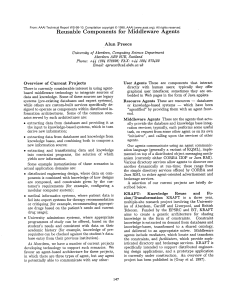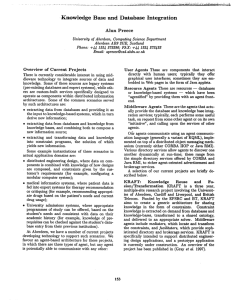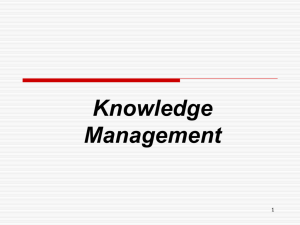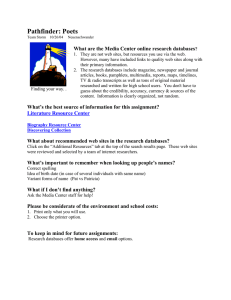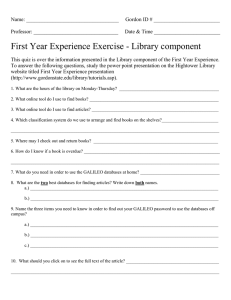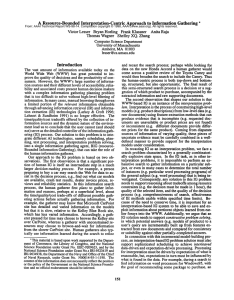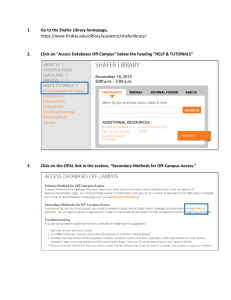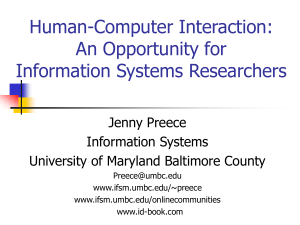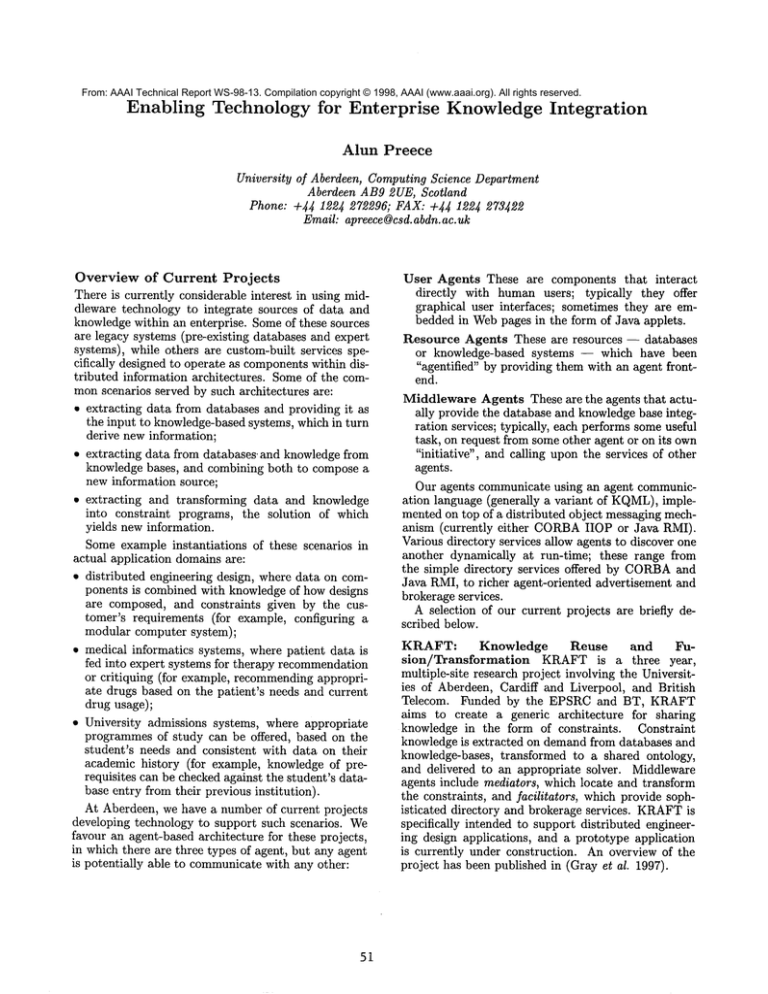
From: AAAI Technical Report WS-98-13. Compilation copyright © 1998, AAAI (www.aaai.org). All rights reserved.
Enabling Technology for Enterprise
Alun
Knowledge Integration
Preece
University of Aberdeen, Computing Science Department
Aberdeen AB9 2UE, Scotland
Phone: +44 1224 272296; FAX: +44 1224 273422
Email: apreece@csd,abdn. ac.uk
Overview of Current
Projects
There is currently considerable interest in using middleware technology to integrate sources of data and
knowledge within an enterprise. Someof these sources
are legacy systems (pre-existing databases and expert
systems), while others are custom-built services specifically designed to operate as componentswithin distributed information architectures.
Someof the commonscenarios served by such architectures are:
¯ extracting data from databases and providing it as
the input to knowledge-based systems, which in turn
derive new information;
¯ extracting data from databases, and knowledge from
knowledge bases, and combining both to compose a
new information source;
¯ extracting and transforming data and knowledge
into constraint programs, the solution of which
yields new information.
Someexample instantiations
of these scenarios in
actual application domains are:
¯ distributed engineering design, where data on components is combined with knowledge of how designs
are composed, and constraints given by the customer’s requirements (for example, configuring
modular computer system);
¯ medical informatics systems, where patient data is
fed into expert systems for therapy recommendation
or critiquing (for example, recommendingappropriate drugs based on the patient’s needs and current
drug usage);
¯ University admissions systems, where appropriate
programmes of study can be offered, based on the
student’s needs and consistent with data on their
academic history (for example, knowledge of prerequisites can be checked against the student’s database entry from their previous institution).
At Aberdeen, we have a number of current projects
developing technology to support such scenarios. We
favour an agent-based architecture for these projects,
in which there are three types of agent, but any agent
is potentially able to communicatewith any other:
51
User Agents These are components that interact
directly with human users; typically they offer
graphical user interfaces; sometimes they are embedded in Webpages in the form of Java applets.
Resource Agents These are resources -- databases
or knowledge-based systems -- which have been
"agentified" by providing them with an agent frontend.
Middleware Agents These are the agents that actually provide the database and knowledge base integration services; typically, each performs some useful
task, on request from some other agent or on its own
"initiative", and calling upon the services of other
agents.
Our agents communicate using an agent communication language (generally a variant of KQML),implemented on top of a distributed object messaging mechanism (currently either CORBA
IIOP or Java RMI).
Various directory services allow agents to discover one
another dynamically at run-time; these range from
the simple directory services offered by CORBA
and
Java RMI, to richer agent-oriented advertisement and
brokerage services.
A selection of our current projects are briefly described below.
KRAFT:
Knowledge
Reuse
and
Fusion/Transformation
KRAFT is a three year,
multiple-site research project involving the Universities of Aberdeen, Cardiff and Liverpool, and British
Telecom. Funded by the EPSRC and BT, KRAFT
aims to create a generic architecture
for sharing
knowledge in the form of constraints.
Constraint
knowledge is extracted on demand from databases and
knowledge-bases, transformed to a shared ontology,
and delivered to an appropriate solver. Middleware
agents include mediators, which locate and transform
the constraints, and facilitators, which provide sophisticated directory and brokerage services. KRAFT
is
specifically intended to support distributed engineering design applications, and a prototype application
is currently under construction. An overview of the
project has been published in (Gray et al. 1997).
Knowledge Reuse and Validation Following the
author’s earlier work in the verification and validation of standalone knowledge-based systems (Preece,
Shinghal, & Batarekh 1992), tools are under development to assist in the design and validation of distributed knowledge-based systems. DISCOVERand
COVERAGE
are tools that support the construction
of multiple-agent systems. DISCOVER
verifies that
"agentified" knowledge bases and databases conform
to a shared Ontology; this is a pre-requisite for sharing knowledge in an integrated
system. DISCOVER
is described in (Waterson & Preece 1997). COVERAGEverifies the well-formedness of "teams" of agents:
it establishes the closure of task interdependencies, by
checking that agents are able to meet their advertised
commitments. COVERAGE
is described in (Lamb
Preece 1996).
Reusable Middleware Components In parallel
with the above projects, we have been attempting to
create a library of reusable middleware components
to ease the construction of knowledge base and database integration applications. Wecurrently have sets
of Java classes for:
¯ agent communication using a subset of KQML,running over Java RMI or CORBAIIOP;
¯ "agentifying"
SQL databases (using JDBC) and
knowledge bases implemented in CLIPS and Prolog;
¯ monitoring and visualising the interaction of agents,
for debugging and demonstration purposes.
As we gain more understanding of building these kinds
of applications, we expect to identify design patterns
which will makeit easier to reuse the above classes.
Acknowledgements The author would like to acknowledge current and recent collaborators
on the
above projects at Aberdeen: Alastair Borrowman, Suzanne Embury, Jutta Eusterbrock, Ted Francis, Peter
Gray, Kit Hui, Graham Kemp, Neil Lamb, Brian Rogers, and Andrew Waterson.
References
Gray, P.; Preece, A.; Fiddian, N.; Gray, W.; BenchCapon, T.; Shave, M.; Azarmi, N.; and Wiegand, M.
1997. KRAFT:Knowledge fusion from distributed
databases and know ledge bases. In Wagner, R., ed.,
Eighth International Workshop on Database and Expert System Applications (DEXA-97), 682-691. IEEE
Press.
Lamb,N., and Preece, A. 1996. Verification of multiagent knowledge-based systems. In ECAI’96 Workshop on Validation, Verification and Refinement of
Knowledge-Based Systems, 114-119. Budapest, Hungary: ECCAI/NJSZT.
Preece, A. D.; Shinghal, R.; and Batarekh, A. 1992.
Principles and practice in verifying rule-based systems. Knowledge Engineering Review 7(2):115-141.
52
Waterson, A., and Preece, A. 1997. Knowledgereuse
and knowledgevalidation. In Verification and Validation o/Knowledge-Based Systems: Papers from the
1997 AAAI Workshop (Technical Report WS-97-01).
Menlo Park, CA: AAAIPress.

